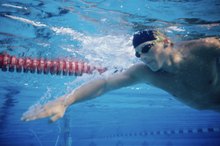The Effects of Swimming on the Lungs
Swimming strengthens the body, helps relax the mind, regulates breathing, stimulates circulation and helps improve lung capacity. Unlike specific weight training exercises or running, swimming benefits the upper body, torso and legs together and it will improve general strength, lung capacity, stamina and cardiovascular fitness 1.
Function
Swimming is beneficial for your lungs 1. It is an aerobic exercise that helps the lungs to use oxygen efficiency. Aerobic exercise helps your large muscle groups and elevates heart rate, which makes your lungs work efficiently. The more you swim, your heart rate will slow down and your blood pressure improves. This makes breathing a much easier task.
- Swimming is beneficial for your lungs 1.
- Aerobic exercise helps your large muscle groups and elevates heart rate, which makes your lungs work efficiently.
Significance
Calories Burned in Swimming vs. Aqua Jogging
Learn More
During all sports, you have to breathe properly to avoid fatigue while participating. This is especially true for swimming, where you must breathe in through your nose and blow out through your lips. This helps your body get rid of carbon dioxide. If you don't breathe in properly when you are swimming, exhaustion sets in and you can't finish the exercise. Breathing properly in swimming will help you feel well while participating and it will help you breathe more efficiently outside of the pool 1.
- During all sports, you have to breathe properly to avoid fatigue while participating.
Considerations
Swimming regularly will make you healthier overall. If you are sedentary, you will develop heart, lung, joint and muscular problems. Swimming will help expand your lungs' capacity, which will help you develop more endurance in and out of the pool 1.
Benefits
How to Lose Weight After 55
Learn More
Swimming is especially helpful to older people or anyone with breathing difficulties. As you age, your lung capacity becomes reduced, as does the ability of your lungs to clean themselves. Swimming helps expand your lung capacity. As you breathe more deeply, your lungs will function more efficiently.
- Swimming is especially helpful to older people or anyone with breathing difficulties.
- As you age, your lung capacity becomes reduced, as does the ability of your lungs to clean themselves.
Technique
When swimming a freestyle stroke -- arm over arm while on your front -- you will turn your head on an every other stroke basis to the side. This is when you will breathe in. If you are right-handed, you will likely turn your head to the right to breathe in when your right arm comes out of the water. You will breathe out through pursed lips when your head is in the water. The timing of the breathing is that you will finish breathing out just as your dominant arm is coming out of the water. That will begin the breathing cycle again. You can also learn to breathe on every second stroke, fourth stroke or sixth stroke when you are more comfortable in the water.
- When swimming a freestyle stroke -- arm over arm while on your front -- you will turn your head on an every other stroke basis to the side.
- The timing of the breathing is that you will finish breathing out just as your dominant arm is coming out of the water.
Related Articles
References
Writer Bio
Steve Silverman is an award-winning writer, covering sports since 1980. Silverman authored The Minnesota Vikings: The Good, The Bad and The Ugly and Who's Better, Who's Best in Football -- The Top 60 Players of All-Time, among others, and placed in the Pro Football Writers of America awards three times. Silverman holds a Master of Science in journalism from the Medill School of Journalism.









